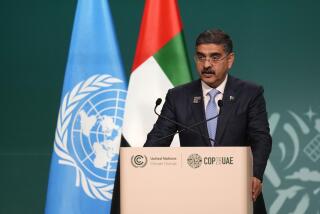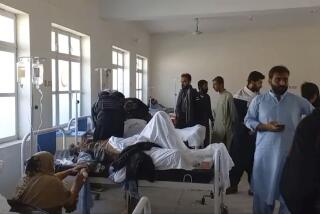Taliban critic slain in Pakistan suicide bombing
- Share via
ISLAMABAD, PAKISTAN — A prominent Pakistani cleric who had publicly condemned the Taliban and its suicide bombing attacks was killed Friday by a teenage suicide bomber who detonated explosives in his office at an Islamic seminary in the eastern city of Lahore. The attack killed at least three other people.
Sarfraz Naeemi, a renowned religious scholar, had spoken openly of his support for the government’s military offensive to root out Taliban militants from the Swat Valley and surrounding regions. His death sparked immediate protests on the streets of Lahore by followers angry at the Islamic militant group and about the lack of security provided by police to Naeemi and his seminary.
The bombing was one of two devastating attacks Friday in Pakistan, where a wave of retaliatory strikes continued amid the government’s attempt to crush the Taliban movement. In the city of Nowshera, about 60 miles northwest of Islamabad, the Pakistani capital, a suicide bomber drove an explosives-laden truck into a mosque at a military installation, killing at least six people and injuring at least 90. The Pakistani Taliban claimed responsibility for both attacks.
Experts have said that the Taliban’s strategy is to cause enough mayhem to erode public support for the 6-week-old offensive. The military has methodically cleared the Taliban out of much of the Swat Valley and the nearby districts of Buner and Lower Dir, and has begun to direct its forces toward pockets of militants in the Bannu region just outside the semiautonomous tribal areas of Waziristan, where pockets of Taliban and Al Qaeda militants have long been entrenched.
But as the government has made substantial gains, it has struggled to cope with the outbreak of almost-daily suicide attacks that are becoming increasingly sophisticated.
Attacks on police and intelligence agency buildings in Lahore on May 27 and on an upscale hotel in the city of Peshawar on Tuesday were well-planned commando-style operations in which the killers breached heavily fortified entrances by firing at security guards before driving their vehicles into the complexes and detonating their explosives.
The Lahore attack killed at least 27 people and injured more than 250. Tuesday’s bombing of the Pearl Continental Hotel, one of Peshawar’s most heavily secured buildings and frequented by Westerners and Pakistani dignitaries, killed 11 people and injured at least 50.
Authorities have beefed up security across the country, particularly in major cities. Nevertheless, militants have kept up the attacks and have varied their tactics to thwart police. In Peshawar, an assailant threw a hand grenade at police officers Thursday night. When a truck filled with police officers arrived, a second assailant detonated his explosives vest. One officer was killed and 12 people were injured.
At the Jamia Naeemia seminary where Naeemi was killed, students complained that security had not been increased despite the fact that the cleric had recently received death threats. Naeemi had outspokenly denounced the Taliban and, on June 2, he led hundreds of followers through the streets of Lahore in a rally in support of the military operation in the Swat Valley.
“He was receiving a lot of threats. They wanted him to stop his anti-Taliban activities, but he wouldn’t do so,” said Naeemi’s brother, Tajwar. “We want to tell the people who killed him that Sarfraz’s death does not mean that his mission has been stopped. We will continue his mission.”
Witnesses said the bomber was a teenage boy who entered Naeemi’s office after Friday prayers.
“Thirty seconds later, there was a big blast,” said one of Naeemi’s students, who asked not to be named. The explosion injured six people. Naeemi was rushed to a hospital but died en route.
Afterward, angry students took to the streets, shouting “Down with the Taliban!” and burning tires. Naeemi’s son, Waqar, pleaded with protesters to exercise restraint, telling them that any act of revenge would contradict Naeemi’s teachings.
“His death is a very significant event. He was one of the most prominent scholars who stood up clearly against suicide bombings and against the Taliban,” said Khalid Zaheer, a Pakistani professor and religious scholar.
“His argument was simple: Religion does not stand for violence. You can’t take the life of any individual, or your own life. And you can’t wage jihad against your own state.”
The explosion in Nowshera occurred at a mosque in a complex that houses military officials. A suicide bomber driving a pickup truck rammed the explosives-laden vehicle into the mosque just as people inside were beginning prayers, police said.
--
Special correspondent Aoun Sahi in Lahore contributed to this report.
More to Read
Sign up for Essential California
The most important California stories and recommendations in your inbox every morning.
You may occasionally receive promotional content from the Los Angeles Times.













